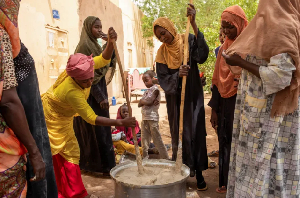African Small and Medium Enterprise (SMEs) can overcome the challenges in accessing global markets if they succeed in integrating food quality management systems in their operations and value chains.
These SMEs, however, have problems in implementing Hazard Analysis and Critical Control Points (HACCP) which are either internal or external to the businesses concerned.
The barriers to implementation of HACCP by SMEs and sustainable compliancy to concurrent certification according to various standards was likely to vary from country to country and business to business.
These issues were brought to the fore at the opening of a four day International Workshop on Food Microbiology and Hygiene in Accra.
The workshop on the theme: “Improving the Microbial Safety of African food Products towards Local and Global markets,” was organised by the International Committee on Food Microbiology and Hygiene (ICFMH) in collaboration with the Food Research Institute of the Council for Scientific Research (CSIR)
The workshop seeks to improve the microbial safety of African food products through identification of microbial hazards in selected food chains and application of internationally accepted methods and standards for preventing food borne diseases and facilitating entry of products and global markets.
Twenty high level scientists, academicians and professionals from 12 African countries, including Ghana, are attending the workshop to assist African food chains meet regulatory and private food safety requirement for trading in Africa and globally.
These are expected to be achieved through assistance to African Laboratories for surveillance of Africa microbial food safety hazards and establishment of sustainable services to food producers in use of the state of the art, robust and cost effective testing methods for identified microbial hazards.
Mr. Robert Tandor, acting Director of Standards of the Ministry of Trade and Industry, said value addition to agriculture products through manufacturing activities and application of quantity standards should be a priority.
Food safety, he said, was important to ensure food security, protecting the health and safety of consumer creation of markets locally and globally for the agriculture produce and processed foods.
According to him; a series of safety crises in the past has requested for stringent measures for the protection of public health and safety of consumers, adding that building capacity of expert regularly in order disseminate knowledge, transfer of technology, upgrade skills and knowhow of Micro Small and Medium Enterprises including the grass root was apt
The Trade Ministry he said was therefore improving the national Quality Infrastructure namely Standardisation, conformity Assessment, Metrology and Accreditation and in view of that some laboratories of some government institutions had been upgraded under the MOTI/UNIDO/SECO Trade Capacity building Programme.
For this reason, the food manufacturing industry in Africa needs to demonstrate compliance with food safety requirement of global economy and produce high value added products.
“SMEs in the food subsector of industry that want to remain in business should reduce the presence of mycotoxins, ochratoxin, and fumonisins, and metals contaminants in food,” Mr. Tandor said
He urged SMEs to seek the services of the National Standards Bodies, Research institutions, Academia and the Ministry, on quality management systems, Food safety management systems and technical regulations in order to operate smoothly without hindrances
Professor Mogen Jakobsen, a board member of the ICFMH, said the organisation is a non profit academic body dedicated to safer and healthier food from the international perspective and has observer and advisory status in activities of the WHO and FAO related to the detection and enumeration of microorganisms in food commodities.
“The ICFMH particularly focuses on Food safety situation in developing countries, with a special mission towards the Africa situation,” he added.
Regional News of Thursday, 19 June 2014
Source: GNA












